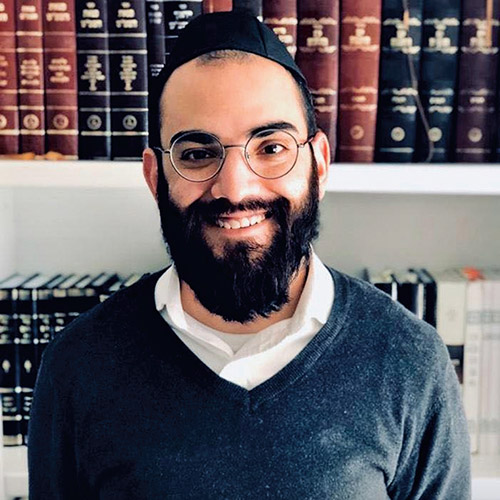
The last thing you’d expect to see if you walked into a group therapy session in a government-mandated substance abuse rehabilitation facility is a bearded, kippah-wearing, tzitzit-wearing, white-shirted counselor. Yet that describes Joseph Rosenfeld, LCSW, who will be the scholar-in-residence this Shabbat at Rinat Yisrael.
Affectionately yet reverently referred to as “Reb Joey,” Rosenfeld is like no other addiction counselor. Working in a secular environment, garbed in full yeshivish regalia, this young, remarkably effective maverick of a counselor etches his way into the minds, hearts and, yes, pain of his clients. And these clients are not everyday citizens, or celebrities who have opted into a resort-style, substance-abuse, in-patient rehabilitation program. They are primarily convicted criminals who were ordered into the program by the judge of a criminal court.
People often feel confused about the nature of addiction. The Jewish Link asked Reb Joey to discuss some of the differences between substance or chemical addiction and behavior addiction. “There is relatively no difference,” he said. “However, in terms of physical dependency there is obviously a difference between a substance for which the user has built up a tolerance and ultimately a dependence, and a process or behavior which carries no neurobiological dependency. From the perspective of the psychodynamic roots of addiction, both substance as well as process addiction are rooted in the drive towards self-medicating.”
Regarding whether chemical or substance addiction and behavior addictions worsen each other, or whether they are separate but equal, Rosenfeld stated, “While there are some behavioral addictions that present themselves as the significant issue, like gambling, sexual addictions etc; other process addictions may not emerge until after someone has undertaken the process of recovery from substance use disorder. The risk of ‘cross addiction’ states that in the absence of the substance of choice, the individual may seek out comfort in seemingly less destructive patterns of behavior—only to find that their deep-seated pattern emerges from the phenomenon of cross addiction into the space of dependency.”
He added, “One of the more significant ideas that emerges from the phenomenon of cross addiction is that the underlying issue in many addictions has a lot less to do with the substance of choice, and a lot more to do with the desire of the subject themselves.”
Some research suggests that although an alcoholic, for example, may succeed in abstaining for many years or permanently, the disease will continue to progress. On this phenomenon, Reb Joey noted, “There are generally two models of recovery for substance abuse: harm reduction and abstinence. While harm reduction is certainly a significant and important model for recovery, the model typically advocated in 12-step programs such as AA are predicated on the abstinence model. Ultimately the decision is made between the individual client and her or his counselor, therapist or support group. In my humble opinion, addiction is a progressive disease that can be treated, but one that does not have a cure.”
Reb Joey also addresses the topic of suffering in his work with recovering substance abusers, citing Talmudic and other Torah luminaries through the ages. There seems to be a consensus that suffering is an imperative for growth, in particular spiritual growth. People seem to struggle with this concept.
“Suffering is a relative concept,” he commented. “As the rabbis state, if one simply expects to find a certain amount of money in their pocket only to discover that they are one or two cents off, they are considered as someone who has experienced suffering. I believe suffering is less about what a person has experienced, and more to do with openness towards the vulnerability and existential reality of this worldly experience. I do not believe it is a question of whether one experiences suffering, but rather how sensitive one is to the reality of this worldly experience.”
Addictive behaviors and substance addiction are known to be in one’s gene pool. Reb Joey elaborated on the difference between someone who succumbs to addiction and someone who doesn’t, despite the fact that it is present in their genetic makeup. “There is much to be said about the genetic predisposition towards addiction. What seems to be clear is that those who have (known) addiction in their family history show a heightened potential towards addiction. But it is important to note that genetics need not be reductive. The fact that a child may witness and learn from the addictive patterns of a parent or grandparent may be as, if not more, significant than the fact that they share a gene pool. Like most psychological and mental health-related illnesses, the answer lies somewhere in between the perennial question of nature vs nurture,” he said, adding, “We are deeply influenced and informed by our earliest experiences.”
The program at Rinat this Shabbat will begin with a Friday night tisch at 8:30 pm. at the shul, led by Reb Joey and Yoni Stokar, owner, manager and drummer for Ta Shma Orchestra. Shabbat morning, following the 9:00 a.m. minyan, Reb Joey will present “The Inner World of Addiction: Spiritual Insight Into a Growing Crisis.” The shiur between Mincha and Maariv will address “The Redemption of Doubt: Doubt as a Spiritual Ideal.”
Reb Joey speaks on Kabbalistic psychology; and his main interest is the interface between psychology, philosophy and spirituality- primarily as they relate to addiction. The scholar in residence program at Rinat this Shabbat is sponsored by The Katz family in memory of Dr. Norman Katz, z”l and the Landes family in memory of Dr. David Landes, z”l.
By Ellie Wolf










